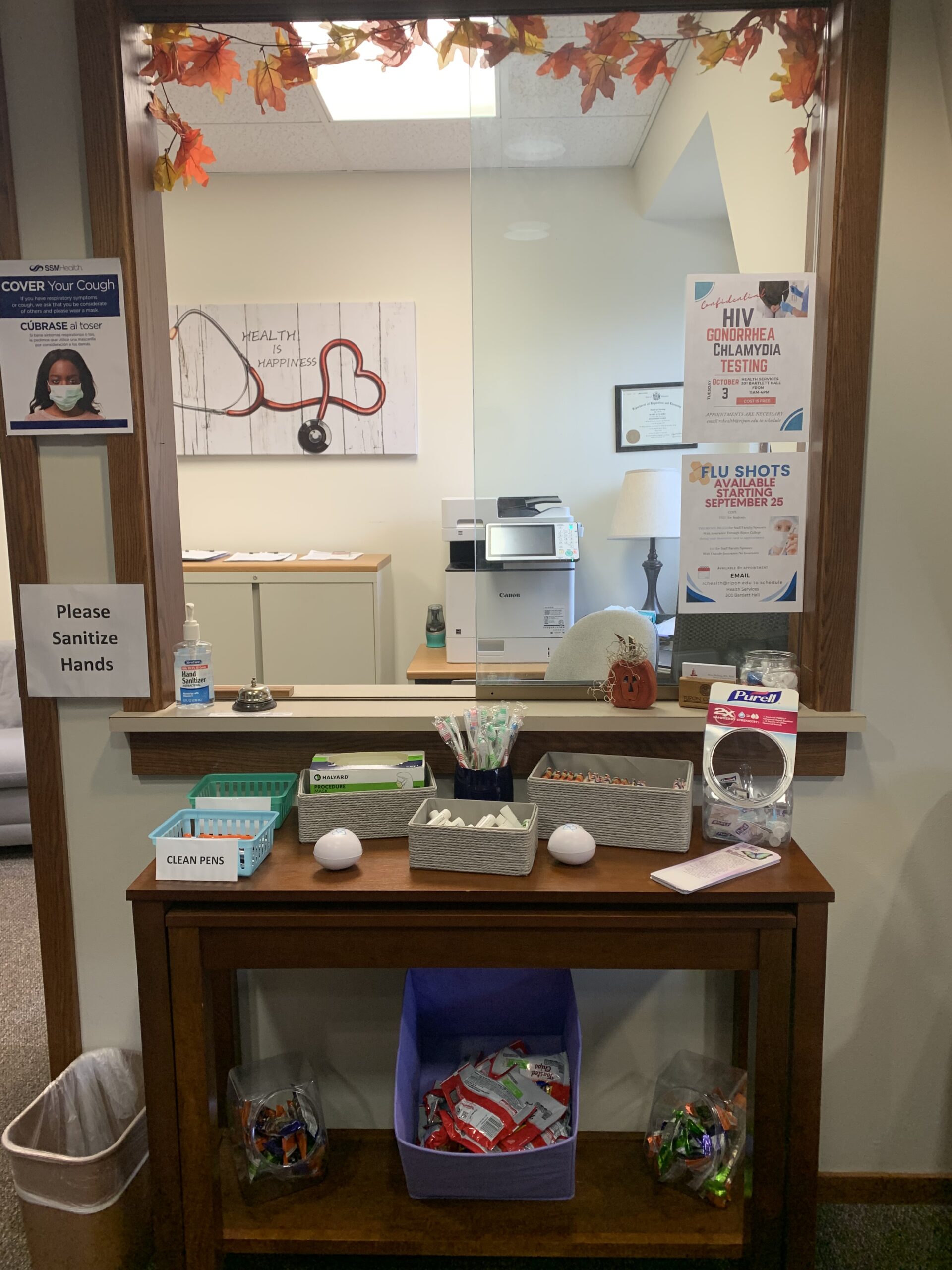By Gwendolyn Frei in College Days, Student Life on October 3, 2023
The director of Health Services provides 10 ways to prevent sickness and 5 ways to get healthy
The leaves are finally falling on Ripon College campus, and with them it seems, are students’ immune systems. Despite the common misconception that the weather is to blame for a low immune system, Mary Belling, director of Health Services, explained that the germs that everyone is being introduced to are the reason for the surge in illnesses this time of year.
“Everybody congregates together in close, small spaces and that’s when all the germs float around. You’re not able to be outside as much. Sometimes there’s not as much sunlight. Those things factor into it.” Belling said.
Belling has been in health care for 20 years and has worked at the college since January. Here’s a comprehensive list she provided of ways to stay healthy this time of year.

Mary Belling sits in the waiting room at Health Services. Photo Courtesy of Gwen Frei.
Preventing Illness:
1) Handwashing
Handwashing is the No. 1 way to prevent illness, according to Belling. She explained that students need to be conscious of all the places germs can be transferred.
“Sneezing, coughing, touching surfaces that other people have touched, handshakes. There are germs everywhere,” she said.
Wash thoroughly, Belling emphasized. “Get a good lather; go under the fingernails, in between, both sides: on palms and the other side, then you can sing the happy birthday song twice in your head. That’s about 20 seconds and then rinse. Use paper towel to dry and use the paper towel to turn off the faucet.”
2) Drink water
People often do not drink enough water throughout the day. Belling suggested students should be drinking “half your body weight in ounces. So if you’re 100 pounds, drink 50 ounces.”
Belling also noted that water intake should increase by 8 to 16 ounces a day if you do get sick. “That’ll really help your immune system help flush your body,” she said.
3) Decrease sugar intake
Lessening the amount of sugar in your diet helps keep your immune system strong. “Sugar adds to inflammation and decreases the immune system function. So if you can limit your sugars that will help keep you healthy,” Belling said.
However, Belling understands the difficulty of cutting sugars, so she suggested that students may “substitute the sugary stuff with fruit because you’ll still get that sugar that you’re craving, but it’s a healthier, more natural sugar.”
4) Vitamin C
Vitamin C can be found in fruits and vegetables such as citrus fruits, broccoli, potatoes, strawberries, kiwis, and bell peppers. However, Belling said, “You can take a supplement if you don’t eat a lot of fruits and vegetables.”
“About 500 milligrams daily throughout this cold and flu season is recommended,” Belling said. She suggests increasing this amount to 1000 to 1500 milligrams if you do get sick.
5) Vitamin D
Vitamin D is another essential vitamin for our immune system. Belling suggested taking 400-1000 international units (often listed on bottles as IU) daily during fall and winter. People usually get Vitamin D from the sun, but “there’s not as much sunlight because the days are shorter and you’re in class,” she said.
People can get vitamin D from foods as well; fish, egg whites, cheese, and mushrooms all have good amounts of vitamin D.
6) Sleep
It’s safe to say that college students don’t get as much sleep as they probably should. Belling explained that students shouldn’t overlook sleep: “Sleep is important for recharging the brain and the body. Eight hours if you can get it.”
7) Change your toothbrush
A simple thing that many people don’t think about is changing their toothbrush. Every 3 to 4 months students should be changing their toothbrush. It carries germs and bacteria and slowly becomes less effective as the bristles wear down.
The Health Services office has individually packaged toothbrushes available for free.

A table in Health Services holds toothbrushes, hand sanitizer, masks, snacks, and more! Photo Courtesy of Gwen Frei.
8) Clean your room
College students spend countless hours in small dorm rooms, and cleanliness in their living space can sometimes be the difference between getting sick and staying healthy.
“So washing your bedsheets weekly, running a duster through, Lysol, and an air purifier sometimes will help too,” Belling said.
9) Don’t share drinks
Belling lists another essential method of preventing the spread of germs: “Not sharing utensils, straws, and water bottles.”
Whether it’s a Starbucks coffee or a friend’s water bottle, sharing drinks during flu season is a surefire way of exposing yourself to germs.
10) Get vaccines
Belling stresses the benefits of the flu vaccination during the cold and flu season. “Get your vaccines too, we’ve got the flu vaccine available for free to students; that opened up on Monday [Sept. 25],” she said.
Belling suggested making an appointment for a vaccine as that will make the process faster and allow you to avoid waiting in the waiting room with other sick students. Email her for an appointment at: [email protected] or [email protected].
If you are sick:
Though Belling’s top 10 ways of avoiding illness are useful and will be a big help during this cold and flu season, there is always the possibility of coming down with a cold. Luckily, she also provided a list of things students can do to improve their health if they do get sick.
1) Over-the-counter medication.
“Take over-the-counter medications like Ibuprofen, Tylenol, Benadryl, and Flonase,” Belling said.
Over-the-counter medication can be a great way to curb symptoms during a cold. Tylenol is great for taking down a fever, Ibuprofen can help with any aches during a cold, Flonase can sometimes help with clearing sinuses, and Benadryl is helpful for allergy symptoms.
2) Cover coughs and sneezes
This tip is less about improving a person’s own health or getting over an illness. In order to prevent spreading sickness to other students, covering coughs and sneezes is essential.
“I would suggest covering your cough and sneeze because the germs fly especially when there’s force behind it,” Belling said.
3) Stay home
The best way to combat a cold is by staying home and resting. This is especially important when you have a fever.
Belling said, “If you have a fever of over 100, stay home and limit your activity to decrease the spread.”
She explained that the No. 1 mistake people make when getting sick is “try[ing] and do[ing] too much too soon. So you start to feel better and then you go back to full activities and your body’s not ready yet.”
4) Get tested
Health services provide many different tests to students for free. You can walk in for a test or make an appointment; though an appointment will likely be faster,” Belling said. “We have strep throat tests, mono tests, Covid tests, and flu tests.”
Health services can also do lab testing for more severe illnesses, though it is not free to students.
5) Come into Health Services if you get worse
If your fever passes 101.5 degrees or there are other respiratory symptoms present, Belling suggests coming into Health services. Health services have many ways to help students, whether you run out of ibuprofen or need to get tested for something, they are available.
The office is located in room 301 on the third floor of Barlett Hall and is open from 8 a.m. to 4 p.m. Monday through Friday. The nurse practitioner, Julie Felix, is available Tuesdays and Thursdays from 9 a.m. to 12 p.m.


